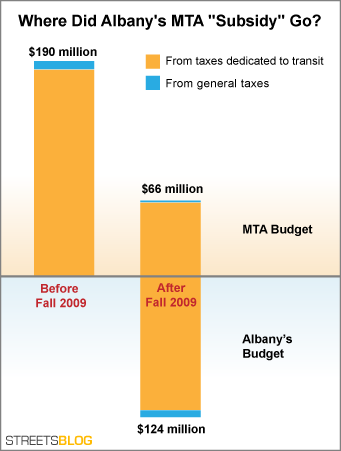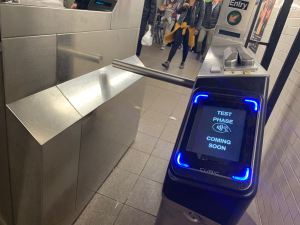The Fare Hike, the Service Cuts, and the Ballot Box
This afternoon the MTA officially unveiled the fare and toll increases it’s proposing to help close the agency’s remaining $400 million budget gap. The dailies had already reported many of the measures on the table, and it looks like the burden is going to fall mainly on New Yorkers who use subways and buses the most. The price of a monthly unlimited Metrocard is either going up to $99 with a 90-ride cap, or it’ll go up to $104 and stay truly unlimited.
 Will legislators pledge not to steal dedicated transit revenues again?
Will legislators pledge not to steal dedicated transit revenues again?So that’s either a 12 or 17 percent hike for people who rely on the transit system for commuting and other daily trips, compared to the overall 7.5 increase in fare and toll revenue. Right after the biggest service cut in a generation. And there’s more pain coming.
All this is happening in an election year after the state legislature stole $143 million from the MTA and TWICE failed to put road pricing to a vote, passing up the chance to direct the revenue toward transit. With the primaries for State Senate and Assembly seats coming up in less than two months, now would be the appropriate time to hold legislators accountable for allowing this slow-motion train wreck to unfold.
A lot of attention will be focused on bridge toll obstructionist Pedro Espada’s high-profile campaign to hold on to his Bronx State Senate seat. Espada is facing a group of challengers — including one with backing from the Working Families Party — in the September 14 primary, where the outcome of most New York City races is really decided.
Espada is far from the only elected official who owes transit riders some answers. Most other incumbents haven’t become such magnets for public scorn, but hardly any of them can say they did all they could to prevent the fiscal catastrophe that transit advocates saw coming from a mile away. No one in the Senate or Assembly, after all, ever had to vote on congestion pricing or bridge tolls.
A glance at Gotham Gazette’s indispensable candidate database reveals that some incumbents won’t get to coast to the general election without facing any competition. Yes, the challengers may be longshots, and many aren’t focusing on transit funding, but they’re keeping the incumbents honest. Congestion pricing foes, like Denny Farrell in Upper Manhattan, and legislators who should have led on the issue but didn’t, like Joan Millman in northwest Brooklyn, will have to defend their records.
With the public circus of fare hike proceedings about to ramp up, we’re going to hear a lot of teeth-gnashing about the MTA (the WFP, whose party line many incumbents will be running on, is already on the case). But a lot more is riding on those primary elections than on the fare hike hearings. The next month and a half is no time to lose sight of that. It’s our chance to get elected officials on
the record about how they’ll turn around the finances of our transit
system.
